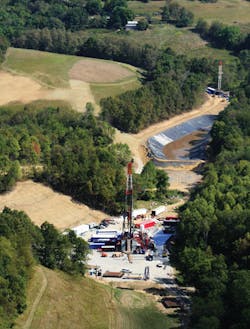West Virginia's Trans Energy now on Marcellus radar screen
Trans Energy and JV partner Republic Energy hard at work to prove up more than 42,000 net acres in Marshall, Wetzel, Tyler and Marion counties, West Virginia
Photo courtesy of Trans Energy
JV with Republic Energy of Dallas has helped Trans Energy create a large footprint in northwestern West Virginia
The Marcellus Shale is generally recognized as the largest and most economic natural gas shale play in the continental United States.
Studies performed by the Energy Information Administration (EIA) estimate core Marcellus potential at approximately 141 trillion cubic feet – a shale gas giant by any measure. Marcellus pioneers such as Range Resources, Cabot Oil & Gas, and XTO Energy cracked the "drilling and completion code," helping to push finding and development costs in the play under $1.00 per Mcfe – lower than any other shale basin in the US. These attributes make the play especially attractive, but add in the Marcellus' optimum location, directly adjacent to the most populated area in the lower 48 states, and you have a game-changer.
Moving the needle
Many investors are aware of the numerous competitive advantages the Marcellus holds, and as a result have become familiar with the large independents developing the play. There are, however, numerous smaller oil and natural gas companies, both public and private, that have also taken steps to aggressively exploit the advantages of the Marcellus. Some of these companies have been operating in the Appalachian region for decades, and their results are starting to move the needle.
One company in particular, Trans Energy, a West Virginia publicly-traded exploration and production company, has quietly built a strategic position in what many consider to be the core of the play in West Virginia. While not new to the public markets, Trans Energy, along with its JV partner Republic Energy of Dallas, has assembled a footprint covering more than 42,000 net acres in four counties in northwestern West Virginia.
Trans Energy's Wetzel County wells deliver strong results: Average 30-day IP rates of 8.1 MMcfe/d
Photo courtesy of Trans Energy
About three trillion cubic feet of gross resource potential is located on the company's acreage position in Marshall, Wetzel, Tyler, and Marion counties. When asked about the strategic vision to exploit this resource potential, President John Corp, a 30-year veteran of the Appalachian basin said, "Our initial objective is to prove up our core acreage position in the Marcellus. To date, we've identified 178 drilling locations where we've got title, identified the pad sites, and mapped out the laterals. We basically just need to file and receive the permits to drill. Given our current acreage position, we feel we have the potential to ultimately get about 400 such locations. We think that kind of inventory could be very attractive to someone with pockets deep enough to exploit this huge resource potential."
Veteran leadership
While Trans Energy's recent success is quite new, the company's history in the basin is not. For more than a decade, Trans Energy has participated in shallow-well drilling opportunities in and around its headquarters in St. Marys, WVa. The low-cost, "Mom and Pop" approach, while moderately successful, kept them mostly under the radar of investors and even nearby operators. Their historical acreage position in Wetzel County, however, attracted a team of shale gas pioneers looking to build on its previous success in the Barnett.
In 2007, Trans Energy entered into a joint venture agreement with Republic Energy, whose technical team includes Dan Steward and Nick Steinsberger, members of the group that refined the method for combining hydraulic fracturing with horizontal drilling in the Barnett shale while at Mitchell Energy during the 1990s.
Republic Energy, however, offered more than just technical expertise. Republic also has the support of institutional investors who specialize in making investments in E&P companies. Combined, Trans Energy and Republic Energy quickly went to work expanding on their core position by identifying and acquiring interests in some of the Marcellus shale's most promising acreage. While takeaway capacity initially limited the "sandbox" to an area near the TETCO pipeline in Marshall County, the JV has since built up positions in Marion and Tyler as well.
As an early partner with Caiman Energy – recently bought by Williams for $2.4 billion – the JV was able to secure crucial takeaway for its capacity in the wet gas areas of Marshall, Wetzel, and Tyler Counties. A recent deal with Momentum 3 will bring pipeline access to the group's position in Marion.
Faced with the need to transition into a resource play company, Trans Energy began to recruit industry veterans who could manage a more robust, high stakes drilling program. Among them was John Corp, who had spent 18 years at Belden & Blake before joining a then start-up called AB Resources. A board member of Trans Energy since 2005, John saw the potential for the JV to build on Trans Energy's largely HBP, legacy position in Wetzel County and welcomed the opportunity to head up operations at the company, eventually becoming its president in 2010.
John quickly went to work and recruited talented oil and natural gas executives, including Harvard-educated, Steve Lucado, who currently sits as the chairman of Trans Energy and heads up the company's capital markets initiatives
Management knows that the real value in the partnership's Marcellus shale position can be best demonstrated by proving up the resource potential across its portfolio and then exploring a sale to a larger, well-funded company. The company has embarked on a horizontal drilling program in Marshall County. The program is designed to act as a blueprint for proving up Trans Energy's acreage position in each county, and with it, the value of the asset.
De-risking acreage through the drillbit
While considerable work is required to determine whether or not Trans Energy can ultimately succeed at completely de-risking its acreage position, initial well results suggested that Trans Energy is headed in the right direction.
After drilling a dozen horizontal wells in Marshall County, the JV achieved average 30-day initial production (IP) rates of 4.1 MMcfe/d. While these results suggest rates of return that are attractive even in the current natural gas price environment, the team believed that its acreage held greater potential. In particular, Dan Steward and Nick Steinsberger from Republic Energy were not satisfied. Each was confident that better results could be generated from the drilling program.
"We took a long, hard look at the results," said Steward. "We examined the science, looked closely at the rock properties, and knew additional resource potential could be generated from the wells. We thought that by altering our completion techniques, we could get better bang for our buck when it came to fracturing that rock."
Expertise is paying off
In 2012, Trans Energy expanded funding to provide additional capital for its share of an eight-well drilling program in Marshall and Wetzel Counties. In November 2012, Trans Energy reported 30-day IP rates on its Dewhurst #110H and Dewhurst #111H wells of 6.7 MMcfe/d and 8.1 MMcfe/d, respectively. Not long after, Trans Energy followed up with additional results on its Anderson #5H and Anderson #7H wells with 30-day IP rates of 9.6 MMcfe/d and 7.0 MMcfe/d, respectively.
While it's possible that the rock properties may simply be different in Wetzel County, as compared to Marshall County, one thing is clear. The wells drilled in Wetzel County with these new completion techniques have delivered 30-day IP rates that averaged 8.1 MMcfe/d. This is nearly double the initial production rates generated from the earlier Marshall County wells. If the wells continue to perform at similar rates over the next 90 days, Trans Energy's expected internal rates of return could rise from approximately 20% to 30% to more than 60% -- a real needle-mover.
In a region where Trans Energy's peers include companies like Chevron, XTO Energy, EQT Corp., and Consol, it's no secret that Trans Energy has its work cut out. But given the recent $590 million all-cash acquisition of 70,000 net acres by Statoil, it's becoming easier to see the value-opportunity locked-up in Trans Energy.
Directly off the heels of the JV's successful drilling results, 42,000 combined net acres in the core of the play (75% of which is held-by-production), and more than three trillion cubic feet equivalent of gross resource potential, Trans Energy is in a position to hit the radar screens of Marcellus followers very soon.





